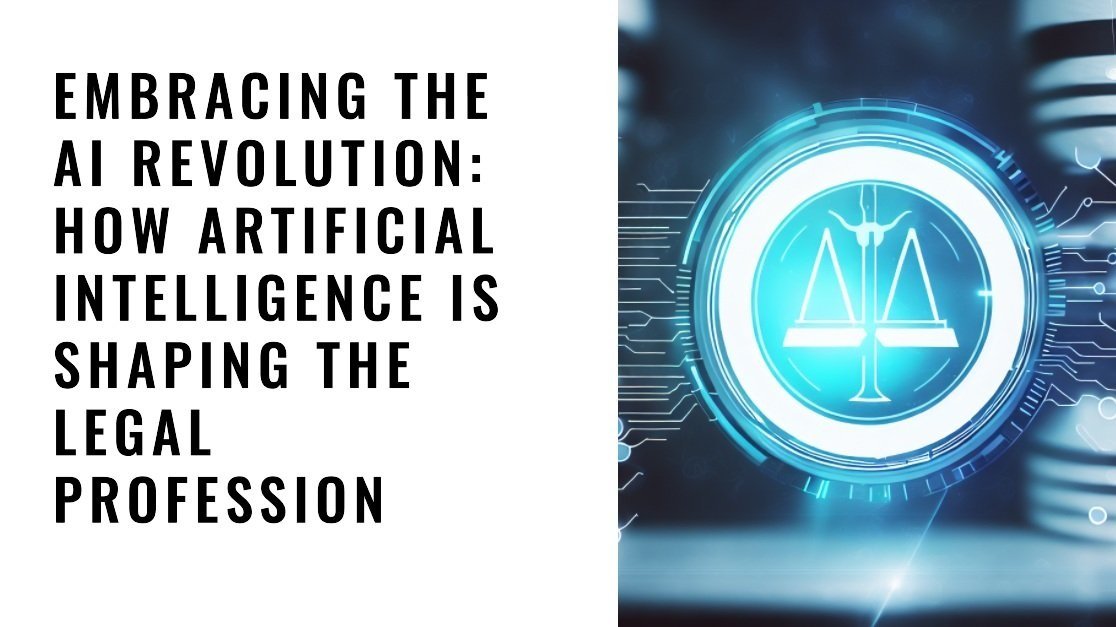Embracing the AI Revolution: How Artificial Intelligence is Shaping the Legal Profession
Artificial intelligence (AI) is transforming industries worldwide, and the legal profession is no exception. As AI becomes increasingly integrated into legal practice, it has the potential to reshape the way legal professionals work, offering numerous benefits and posing new challenges. In this post, I'll discuss the impact of AI on the legal profession, the advantages it can provide, the challenges it presents, and the skills required to adapt and thrive in this new landscape.
The Impact of AI on the Legal Profession
AI is revolutionizing various aspects of the legal profession, from research and document analysis to predictive analytics and automation. Here are some areas where AI is making significant strides:
Legal Research: AI-powered research tools can analyze vast quantities of legal data to identify relevant cases, statutes, and regulations, streamlining the research process and providing more accurate results.
Document Review and Analysis: AI can quickly review and analyze contracts, leases, and other legal documents, identifying potential risks and discrepancies, as well as automating the drafting process.
Predictive Analytics: AI algorithms can help predict case outcomes, assess settlement values, and determine the likelihood of success in litigation, enabling legal professionals to make more informed decisions.
Automation and Efficiency: AI can automate routine tasks, such as document management, billing, and scheduling, improving efficiency and freeing up time for more complex, strategic work.
Benefits of AI in the Legal Profession
The integration of AI into the legal profession offers several potential benefits:
Increased Efficiency: AI can streamline time-consuming tasks, allowing legal professionals to focus on higher-level strategic work, enhancing productivity, and potentially reducing costs.
Improved Accuracy: AI algorithms can identify patterns and analyze data more accurately than humans, leading to better decision-making and reduced errors.
Enhanced Access to Justice: AI-powered legal tools can help bridge the justice gap by providing affordable, accessible legal services to those who might not otherwise be able to afford traditional legal representation.
Innovation and Growth: The adoption of AI can drive innovation in the legal profession, opening up new opportunities and business models.
Challenges and Considerations
Despite its potential benefits, the rise of AI in the legal profession also presents several challenges and considerations:
Ethical Concerns: The use of AI raises various ethical questions, such as data privacy, algorithmic bias, and the potential loss of human oversight in legal decision-making.
Job Displacement: As AI automates routine tasks, some legal jobs may be at risk. Legal professionals must adapt and develop new skills to remain competitive in the job market.
Regulatory and Legal Frameworks: As AI continues to develop, lawmakers and regulatory bodies must create and update laws and regulations to address the unique challenges and implications of AI in the legal sector.
Technical Limitations: While AI has the potential to revolutionize the legal profession, it is essential to recognize its limitations. AI tools are only as good as the data and algorithms they rely on, and they may not always provide perfect results.
Skills Needed to Adapt and Thrive in the AI-Driven Legal Landscape
To adapt to the AI revolution and thrive in the evolving legal landscape, legal professionals must develop new skills and embrace a growth mindset:
Technological Competency: Familiarity with AI tools and technologies, along with general tech-savviness, is crucial for legal professionals to stay relevant in the digital age.
Data Literacy: As AI relies on large datasets to function effectively, legal professionals must be able to understand and analyze data to make informed decisions and recommendations.
Emotional Intelligence: As AI automates routine tasks, legal professionals will need to focus on developing empathy, active listening, and other soft skills to provide personalized and compassionate legal counsel to their clients.
Adaptability and Continuous Learning: As technology continues to evolve, legal professionals must be open to change and commit to lifelong learning to stay current with industry trends and developments.
Conclusion
The rise of artificial intelligence in the legal profession presents both opportunities and challenges. By embracing AI and developing the necessary skills to adapt, legal professionals can leverage the benefits of AI, overcome potential obstacles, and thrive in an increasingly digital world. The future of law is bound to be shaped by AI, and those who are prepared to grow with it will be best positioned for success.

